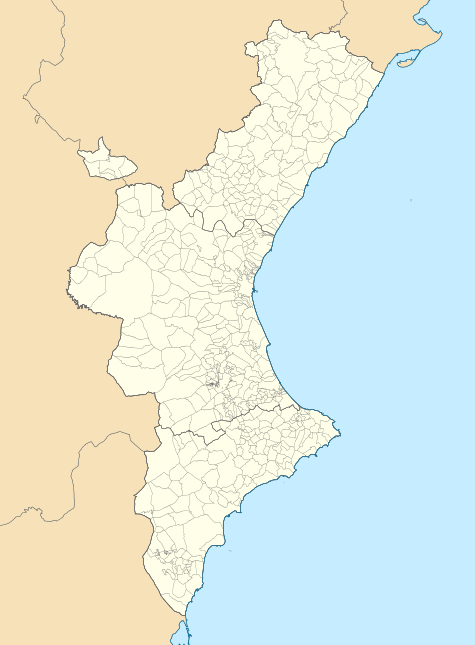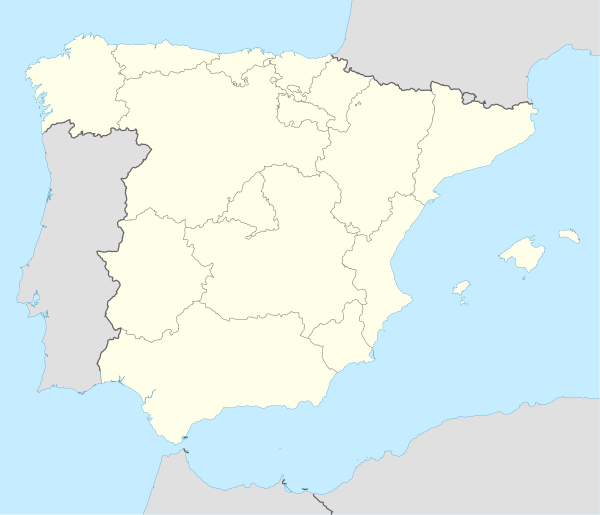Borriana, Castellón
Borriana (Valencian: [boriˈana]) or Burriana (Spanish: [buˈrjana]) is a town in eastern Spain, in the province of Castellón, part of the autonomous community of Valencia. Its population exceeds 34,000.
Borriana/Burriana | |
|---|---|
 | |
 Flag  Coat of arms | |
 Borriana/Burriana Location in Spain  Borriana/Burriana Borriana/Burriana (Valencian Community)  Borriana/Burriana Borriana/Burriana (Spain) | |
| Coordinates: 39°53′22″N 0°05′33″W | |
| Country | |
| Autonomous community | |
| Province | Castellón |
| Comarca | Plana Baixa |
| Judicial district | Castelló de la Plana |
| Government | |
| • Mayor | Maria Josep Safont Melchor [1] (PSPV-PSOE) |
| Area | |
| • Total | 47.2 km2 (18.2 sq mi) |
| Elevation | 13 m (43 ft) |
| Population (2018)[2] | |
| • Total | 34,544 |
| • Density | 730/km2 (1,900/sq mi) |
| Demonym(s) | Borrianenc/a |
| Time zone | UTC+1 (CET) |
| • Summer (DST) | UTC+2 (CEST) |
| Postal code | 12530 |
| Official language(s) | Valencian and Spanish |
| Website | Official website |
The town is located by the Mediterranean Sea, at the lowest region of the Plana Baixa, surrounded by orange tree fields watered by the Millars River.[3]
It has about 15 km of coastline, including Borriana's principal beach "El Arenal", one of the most attractive spots, especially during the summer. "El Arenal" has about 2 km of seashore, has been awarded the blue flag, which recognizes its magnificent sand and water thanks to the treatments carried out by the city council.
The seaside is 1.5 km from the center of the town. During the summer the seaside population can triple due to vacationers and from locals from the center of the town moving into the seaside. The town is reachable from Castellón de la Plana through the CV-18 or the N-340 routes.
In literature, Burriana is briefly described by James A. Michener in the book, Iberia. As a young man, Michener landed there as a part of a ship crew. The merchant vessel was there to collect oranges for the Scottish marmalade industry. Oranges, after being loaded into metal barrels, were dragged out to sea by bulls.
The town exposes many memorial spots dedicated to James A. Michener, such as a street and a sign that quotes one of his passages, where he expresses his first sight of Borriana as he approached land from the sea.
Villages
- Burriana town proper
- Les Alqueries de Santa Bàrbara
- El Port de Borriana (Borriana harbor)
- El Grau de Borriana
- La Serratella
- Les Alqueries del Ferrer
- Poblats marítims
- Virrangues (uninhabited)
Main sights
- Church of El Salvador (13th century), with an apse in early Gothic style, and Romanesque elements as well. The bell tower is from the 15th century.
- Sea Tower (16th century)
- Modernist House
- Underwater Archaeology Center
- Clot de la Mare de Déu natural park
- Orange Museum
- Municipal Archaeology Museum
Notable people
- Juan Bautista Soler Martí (1879-1936); businessman, alcalde of Burriana (1930-1931), co-responsible for rapid upgrade of the port infrastructure
- Jaime Chicharro Sánchez-Guió (1889-1934); politician and entrepreneur, heavily contributed to development of the Burriana harbor
- Enric Monsonís Domingo (1931-2011); liberal politician, served as the head of the pre-autonomous government of the Consell Pre-autonòmic del País Valencià (Pre-autonomous Council of the Valencian Country) from 1979 to 1982.
- Vicente Enrique y Tarancón (1907-1994); Cardinal of the Roman Catholic Church, served as Archbishop of Madrid from 1971 to 1983.
- El ultimo ke zierre; punk band
Twin towns

References
- http://www.burriana.es/index.php/es/ayuntamiento/gobierno/gobierno-municipal/altocargo/maria-jose-safont-melchor
- Municipal Register of Spain 2018. National Statistics Institute.
- Joaquim Aparici Vilar, L'Agricultura al terme de Borriana, Universitat Jaume I, Castelló de la Plana. ISBN 84-8021-030-3